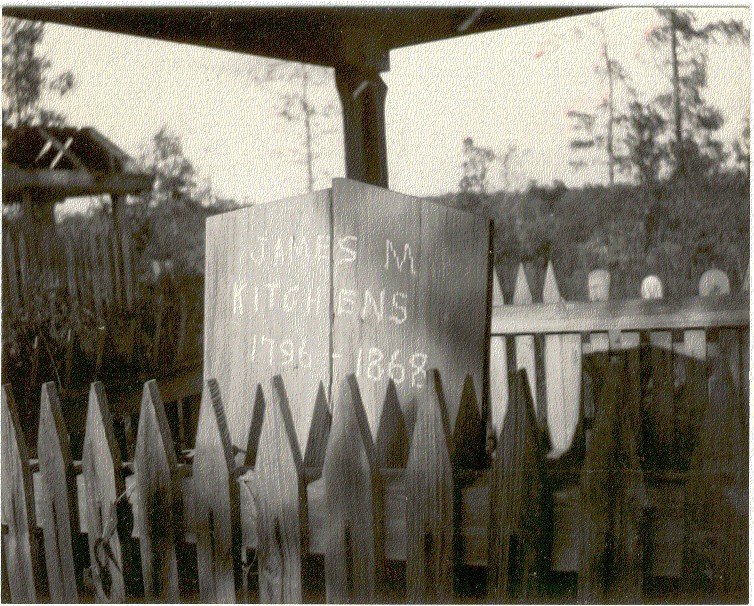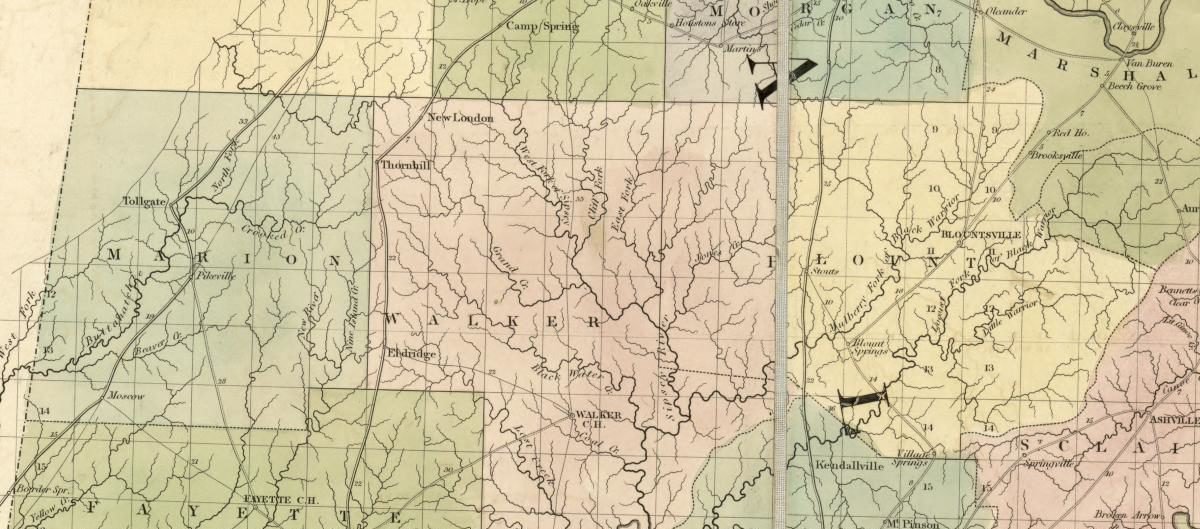
Full research report:
The Ancestry of James Matlock Kitchens (PDF)
A little while ago, I made a research trip to Walker County, Alabama, and I shared with you here the Civil War letter of James Matlock Kitchens. James Matlock Kitchens (1796–1868) was a neighbor and friend to our early Duttons in Basham’s Gap, Alabama, a fellow Baptist with Stephen Penn and Edmond Dutton (he vouched for Stephen Penn in his Revolutionary pension application in 1832) and later became a Baptist preacher himself. He is the ancestor of a couple of branches of Duttons: his daughter Elizabeth Kitchens married Thomas Dutton, and his daughter Mary Kitchens married Harvey W. Hamilton, whose son Christopher Columbus Hamilton married Elizabeth Ann Dutton. There are lots of other family connections as well, as James Kitchens moved with the Duttons, Sparks, Hogans, and many other Basham’s Gap families down to Walker County. The Kitchens family ties in mainly to the family of John Dutton (b. 1778), son of Zachariah Dutton, whose family will be the subject of my next Dutton volume.
Anyway, that trip and that letter reignited my interest in the Kitchens family, and with Mary Kay Coker, a Kitchens descendant, I’ve been doing some research in DNA and records to determine James Matlock Kitchens’ origins and ancestry. For quite a number of years, online trees have attributed to James Matlock Kitchens the father “Christopher Kitchens” — based on the assumption that an old man named Christopher, age 80, listed in James Kitchens’ household on the 1850 census was James’s father.

But there was no trace anywhere in records, in Alabama, Tennessee, or Virginia, of anyone named Christopher Kitchens. Mary Kay was convinced even long before I was that there was no such person as Christopher Kitchens — that this person on the census was someone else entirely, namely Christopher Acuff, who appeared in other records with James Kitchens and the Kitchens family in Alabama and Tennessee, and was more than likely James’s uncle.
Few things spur me to greater research more than incorrect assumptions that are accepted as fact, especially those based not on research but on copying other people’s trees. So we determined to find the true origins of James Matlock Kitchens. Using a collection of well-placed DNA tests, and some outstanding archival research by Mary Kay Coker, we very soon found the trail.
Kitchens Y-DNA
This is, in some ways, telling the story backwards — we didn’t discover and confirm James Kitchens’ Y-DNA haplogroup until quite far along in our research. But in this telling, it will set us quickly on the right path.
When we started this work, the only Kitchens Y-DNA tests that anyone had done were from male descendants of George Kitchens (born ca. 1784 in Virginia), believed to be the brother of James Matlock Kitchens. This is thanks to Alice Kitchens Gutierrez, who has been a great help in this research. George Kitchens also went to Walker County, Alabama, and died there in the 1860s.
And from that beginning, we discovered that George Kitchens’ Y-DNA matches were not to other Kitchens men, but to men named Matlock or Medlock. Given James Kitchens’ known middle name of Matlock (also sometimes spelled Medlock), this was interesting. And it prompted us to push to test James Kitchens’ Y-DNA. Would he also match the Matlocks, or match men named Kitchens?
It took us a couple months to find a Kitchens male to test for James’s line. In the meantime, autosomal DNA research yielded a lot of fruit. But when the Kitchens Y-DNA came back, I was a little flabbergasted. “Haplogroup T?” I had never even heard of haplogroup T. It’s quite uncommon for males of Western European descent, found in only about 1% of that population. “Surely this is a mistake,” I messaged Mary Kay. I did not see any Kitchens matches in our tester’s results, or Matlocks either. Mary Kay was unperturbed and was already a few steps ahead. “Look deeper,” she said. And there at the very bottom of the match list, at what appeared a great genetic distance, was one Kitchen(s) match: a test from Floyd Gerald Kitchen (1935–2017), a descendant of William Kitchen in East Tennessee.
The other matches, surprisingly, included a lot of men named Jefferson, who, it turned out, where the closest Y-DNA relatives to President Thomas Jefferson. Through our Kitchen(s) Y-DNA testing, Thomas Jefferson got a new haplogroup.
In the end, after conducting Big Y-700 tests on both J.P.K. (our James Matlock Kitchens tester) and F.G.K. (the East Tennessee Kitchen tester), we proved conclusively that both James Matlock Kitchens (b. 1796) and William Kitchen (b. ~1776) were descendants of a common paternal ancestor estimated to have been born about 1752. That is, it is highly likely that they were brothers.* To discover the precise relationship, we turned to autosomal DNA and to records.
* Or if not brothers, very close male relatives sharing a close common ancestor within about 1–3 generations, e.g. uncle and nephew, first cousins.
Full details are in the report.
Autosomal DNA
We were fortunate that we had access to several DNA tests that proved to have ample Kitchens DNA. We would like to thank in particular:
- Mr. Virgil “Mac” Hamilton (1936–2019): James Matlock Kitchens (b. 1796) > Mary (Kitchens) Hamilton (b. 1814) > Christopher Columbus Hamilton (b. 1853, md. Elizabeth Ann Dutton).
- Mrs. Vicille (Hogan) Hill (1932–2018): James Matlock Kitchens (b. 1796) > Elizabeth (Kitchens) Dutton (b. 1817) > Lavina P. (Dutton) Hogan (b. 1850)
Both of them are John Dutton (b. 1778) descendants.
We discovered, through clustering of AncestryDNA shared matches and autosomal mapping on Family Tree DNA, GEDmatch, and MyHeritage, strong, triangulated, and consistent DNA matches that connected James Matlock Kitchens to a family of Kitchens who were born in Virginia between about 1770 and 1790, and settled in Grainger, Roane, and Anderson counties in East Tennessee beginning about 1796. In addition, these matches are shared by descendants of the Matlock family of Bedford County, Virginia, and also later East Tennessee.
Full details, including specific matches, are in the full report.

X-DNA
Of especially great importance to this research was X-DNA, the DNA of the X chromosome (female sex chromosome). Because of X-DNA’s unique inheritance pattern, it can both preserve large segments of very old DNA, and allow the genealogist to narrow down from whom it was inherited to a smaller subset. Our tester Mrs. Vicille Hogan Hill proved to be in an ideal position to inherit X-DNA from James Matlock Kitchens and therefore from his mother.

We found a large segment at the end of Vicille’s paternal X chromosome (the X chromosome she inherited from her father) that matched a large number of other Kitchen(s) descendants, both descendants of James Matlock Kitchens and of several of the proposed Kitchen siblings in East Tennessee. It also matched several Matlock women — indicating that James Kitchens’ mother was probably a Matlock. It also indicates that James Kitchens had the same mother as the siblings whose descendants Vicille matched.
Full details are in the report.
John Kitchen (1757–1847) of Virginia and Tennessee
We believe, based on this research into both DNA and records, that James Matlock Kitchens was the son of John Kitchen (1757–1847), a Revolutionary veteran who came to East Tennessee from Virginia about 1796, and his first wife, a Matlock lady, a descendant of William Matlock (1702–1767) of Bedford County, Virginia. John Kitchen was the son of William Kitchen (b. ~1730), who originated in Bedford County and whose land neighbored William Matlock’s.
Our Kitchens testers have DNA matches with each of the following individuals, whom we believe to be siblings of James Matlock Kitchens:
- Martha (Patsy) Kitchen, born perhaps about 1774 in Henry County, Virginia; married (1) Cain Acuff in 1797 in Grainger County, Tennessee, (2) John Sullivan.
- William Kitchen, born perhaps about 1776 in Bedford County, Virginia; married Nancy Matlock in 1801 in Knox County, Tennessee. He died after 1840 in Missouri.
- John Kitchen, born 1778 in Bedford County, Virginia; married (1) Mary Dennis, probably in Grainger County, Tennessee, and (2) Catherine McQuistion. He served in the War of 1812 from Grainger County and later lived in McMinn County, Tennessee.
- Jesse Kitchen, born perhaps about 1780 in Bedford County, Virginia; married Catherine Acuff in 1802 in Grainger County, Tennessee. He later moved to Arkansas and then to the Republic of Texas, where he died in 1837.
- Mary (Polly) Kitchen, born about 1783 in Henry County, Virginia; married Samuel P. Stewart.
- George Kitchen(s), born about 1784 in Henry County, Virginia; married (1) Lucy Cox in 1806 in Grainger County, Tennessee, and (2) Oma Dillard in 1827 in Lauderdale County, Alabama. He followed James Matlock Kitchens to Lawrence County, Alabama and later to Walker County, where he died probably after 1860. The fact that his descendants have strong autosomal matches with descendants of these other siblings, but different Y-DNA, suggests that he was likely a half-brother, a child of the same mother but not the same father.
- Elizabeth Kitchen, born perhaps about 1788 in Henry County, Virginia; married Josiah Oaks 6 Jan 1807 in Campbell County, Tennessee.
- Charles Kitchen, born perhaps about 1790 in Henry County, Virginia; married Joanna Matlock in 1813 in Roane County, Tennessee.
- James Matlock Kitchen(s), born 1796 in Grainger County, Tennessee, or possibly Jefferson County, if family legend be believed; married (1) Sarah Brown about 1813 in White County, Tennessee; (2) Syntha (maiden name unknown) about 1845 in Walker County, Alabama. He moved to Lawrence County, Alabama, about 1817, and to Walker County about 1836. He died in 1868.
John Kitchen (b. 1757) had at least one child with his second wife, Mary Whitten:
- Susan Kitchen, born 1803 in Anderson County, Tennessee, married William Stooksbury.
After moving first to Grainger County, Tennessee, about 1796–1797, John Kitchen moved to nearby Anderson County, Tennessee, where he lived the rest of his life, dying in 1847.
These conclusions, supported by both archival research and multiple triangulated DNA matches, present a step forward in our understanding of the Kitchen(s) family; a far leap ahead of “Christopher Kitchens” for whom no primary sources could be identified, at whom research on this family had been dead-ended for a couple of generations.
For more evidence and our full conclusions, please read the research report:


I am delighted to spectate from the bleachers as it were. James Matlock Kitchens attested to my ancestor, Stephen Penn’s Rev War pension and I descend from two Penn daughters (Elizabeth m. Richard Day AND Sarah m. Reuben Simpson).
Thanks, Joseph for all of your research in the Dutton ancestry and its overlap with my Day, Penn, and Simpson ancestry. It takes a village.
That’s wonderful! So glad to meet you. I’m sure you probably know about the Stephen Penn dedication next month too. Did you see the repair work we did last week on Elizabeth (Penn) Day’s tombstone? Silly Facebook wouldn’t let me send you a friend request because I “don’t know you personally.” 😢 Have you done a DNA test? Having “double Penn” is always hopeful for possibly unlocking ancestral secrets!
My name is David Hogan. That was interesting thank you for putting this report together.
Thank you for the feedback! And you’re welcome! Are you kin to the Kitchens? And to the Hogans?
Hi, this is exceptional work and very interesting in relation to my trying to pursue my Kitchens family history.
My father was a great grandchild of Christopher Columbus Kitchens.
I have seen church records of C.C. Kitchens and have records of his family collected from other family members.
I would be interested in sharing information to put together this puzzle with more detail!